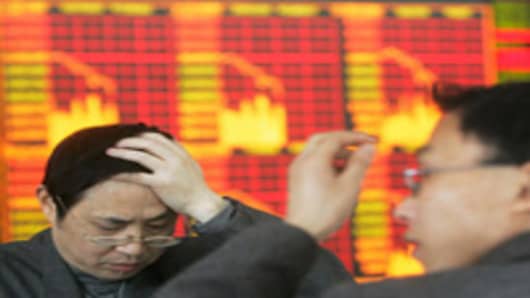Markets bleed red all over the region Tuesday, with Japan's Nikkei losing 5 percent and South Korea's KOSPI shedding 6 percent, as upheaval on Wall Street fueled investor uncertainty about a spillover into Asia.
Government debt was in heavy demand for a second day with increased speculation about an aggressive U.S. Federal Reserve interest rate cut later, and shares outside Japan hit a 2-year low after one of the most explosive 48-hour periods in the finance world.
Lehman Brothers filed for bankruptcy, Bank of America agreed to buy Merrill Lynch , the Fed expanded its emergency liquidity provisions and American International Group , once the world's biggest insurer, was seriously constrained by short-term funding trouble.
Investors ditched oil and sought stability in the yen and high-grade debt. Crude prices fell for the sixth of the last seven days, to $92 a barrel, the lowest since February.
The U.S. dollar slipped to 104.31 yen after ending overnight in New York around 104.54 yen. It had its biggest single-day decline against the yen on Monday in nine years.
Japan's Nikkei 225 Average finished down 5 percent to a three-year low as investors dumped shares following turmoil in Wall Street. Japan's top three lenders plunged, with No. 2 Mizuho Financial Group and No. 3 Sumitomo Mitsui Financial Group down more than 10 percent. Exporters such as Canon and Toyota Motor also tumbled after the yen gained sharply against the dollar.
South Korea's KOSPI plunged 6 percent, its lowest close in 18 months. The index sank as much as 7 percent at one point of trade. The Korea Exchange temporarily suspended program selling orders on both the KOSPI and junior Kosdaq market due to volatile futures prices. Financials including Kookmin Bank and Woori Finance Holdings plunged on deepening fears about the global financial system. Blue chip shares likewise tumbled as investors moved to cut losses. Hynix Semiconductor lost 11 percent. POSCO, the second biggest share by market cap, fell 5.8 percent.
The Australian market fared the best in Asia, finish just 1.4 percent lower, though ending at a two and half year low, but recovered from their lows as some investors bet that global central banks could join hands to stabilize fragile financial markets. Resource counters such as BHP Billiton and Newcrest Mining managed to eke out gains in the midst of the regional bloodshed. But Macquarie Group and Babcock & Brown were not spared, the latter crashing 33 percent.
Hong Kong stocks sank 5.4 percent, tracking regional markets lower. Blue chips including PCCW, China Mobile and HSBC Holdings all tumbled sharply.
Singapore bank and property stocks fell with the Straits Times index down 1.1 percent. CapitaLand, Southeast Asia's largest property developer, was down 1.7 percent, while DBS Group also gave up 0.7 percent.
China's Shanghai Composite Index fell 4.5 percent, below the 2,000-point level, which was seen as major support. Many analysts think the surprise monetary easing announced by China's central bank on Monday was designed to prevent the index breaking that level, but that didn't work with bank shares taking the worst hit.


